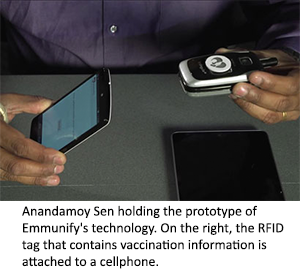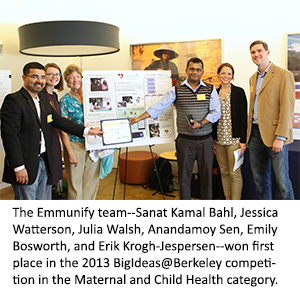By Sarah Bernardo

Preeclampsia–a pregnancy complication characterized by high blood pressure, swelling, and protein in the mother’s urine–is the second leading cause of maternal mortality worldwide. Nearly 76,000 women and 500,000 babies die from preeclampsia complications annually; deaths that could be prevented with early detection of the condition. To address this global health crisis, a team of public health students, with support from the Big Ideas Contest, are designing a preeclampsia diagnostic tool that will save lives in resource-constrained settings globally. The urinary-based test is affordable, easy to use, and can be used at home by women to self-screen for the onset of preeclampsia.
“This test is important in low-resource settings where women don’t have adequate access to pre-natal care screenings,” said Denali Dahl, a Duke University Global Health master’s student and co-creator of the device. “Preeclampsia is pretty common and its prevalence is similar worldwide, but women in high-resource settings have greater access to pre-natal care screenings. In places where women don’t have those pre-natal care screenings, the complications often go undiagnosed until they become severe or fatal.”
The motivation to develop a preeclampsia diagnostic test first arose when two of the tool’s co-founders, Brian Matovu and Zoe Sekyonda–undergraduate Bioengineering students at Uganda’s Makerere University, noticed that preeclampsia was a huge problem in their hometown of Kampala, Uganda. OBGYNs and nurses at Mulago National Referral Hospital in Kampala affirmed that the high number of preeclampsia and eclampsia cases posed a serious concern.
“In Uganda, women will go in for one pre-natal care visit when they first realize that they’re pregnant, but then don’t return to the hospital until they have a severe complication or it’s time for them to give birth,” said Dahl. “We want women to know when they’re developing [preeclampsia]. The earlier a woman is diagnosed, the sooner she can receive the necessary care to help herself and her child.”
Dahl attests that the biggest barrier to seeking treatment for women in low-resource settings, like Uganda, is lack of accessibility. When pregnant women living in rural areas begin to feel sick, they are given herbs or traditional remedies. If that fails they may visit a local clinic or hospital, which often doesn’t have the resources to make an accurate diagnosis. From there, women are referred to the National Referral Hospital in Kampala. However, getting there involves high financial and time costs.
“If a sick woman needs to go to Kampala, she has to go the bus station and wait several hours for the next bus to come,” Dahl said. “Then, it may be a 12 hour bus ride to the hospital. When she gets to the hospital, it’s overcrowded, so she has to wait several hours before she can see the doctor.” Dahl and her teammates hope that their test can help women with preeclampsia better navigate these barriers.
The idea for the diagnostic tool was developed in a graduate-level course that is jointly offered between Duke and Makerere University. What began as a class project quickly morphed into a functional development plan, and grew from there. As the innovation continued to iterate, the team applied to the Big Ideas Contest in the hopes that seed funding would allow them to successfully refine and deploy their tool. The team utilized Big Ideas resources to successfully develop their innovation, noting how the program’s mentorship and support allowed them to bring their idea to the next level.
“When we first started this competition, we had a vague idea of what we wanted to do but didn’t really understand how to do it.” said Dahl. “Our mentor, Dr. Richard Lowe, was phenomenal and helped us think through the process.” Cross-cultural and multidisciplinary was also key to the team’s success. “The power of collaboration between students of engineering, global health, medicine, and social innovation in the United States and Uganda was incredible.”
Looking to the future, the team’s one year goal is to move beyond the proof-of-concept stage to develop and deploy a functioning prototype. Over the next two to five years the team plans to focus on implementation of the product while gaining a deeper understanding of the broader innovation ecosystem. The team is committed to ensuring their tool is contextualized and fits the needs of the end user in Uganda.
While the diagnostic tool will enable early diagnosis, the team recognizes that lack of access to health care in Uganda is a multi-faceted systemic problem. “Our diagnostic test is not a silver bullet to fix all of the problems associated with accessing health care, but rather an early warning method so women can begin the lengthy process of seeking care weeks before they currently do,” said Dahl.
Future Plans:
After receiving her Masters of Science in Global Health at Duke University this spring, Dahl will be starting a PhD program in Biomedical Engineering at the University of North Carolina, Chapel Hill. Sekyonda and Matovu will both be graduating in June with a Bachelors of Science in Bioengineering from Makerere University. Sekyonda hopes to pursue a higher degree in the field of molecular biology, but also in line with biomedical engineering. Matovu plans to seek employment after graduation while concurrently seeking opportunities for higher education in the biomedical field.
 It was standing room only in Blum Hall Wednesday night as seven teams competed in Berkeley’s 6th Annual Rudd Family Foundation Big Ideas Grand Prize Pitch Day.
It was standing room only in Blum Hall Wednesday night as seven teams competed in Berkeley’s 6th Annual Rudd Family Foundation Big Ideas Grand Prize Pitch Day. Former White House Deputy Director for Technology and Innovation and Big Ideas founder,
Former White House Deputy Director for Technology and Innovation and Big Ideas founder, 
 Transforming the PedalTap from an idea into a usable product was a challenging process for the team. Grace Nakibaala, team lead for PedalTap explains, “We were stretched in ways we never imagined, way beyond our comfort zones.” She continues, “One of the challenges we faced quite early on, as a multidisciplinary team of students, was in making time for our project. Our schedules never seemed to align, but we quickly learned that if this was important to us, which it was, we had to make time for it.”
Transforming the PedalTap from an idea into a usable product was a challenging process for the team. Grace Nakibaala, team lead for PedalTap explains, “We were stretched in ways we never imagined, way beyond our comfort zones.” She continues, “One of the challenges we faced quite early on, as a multidisciplinary team of students, was in making time for our project. Our schedules never seemed to align, but we quickly learned that if this was important to us, which it was, we had to make time for it.”

 For many student innovators, Big Ideas has served as the first step in turning a grand hunch into a viable proposal. Last year, Amelia Phillips and her Big Ideas team won the first place award in the Conflict & Development category for the
For many student innovators, Big Ideas has served as the first step in turning a grand hunch into a viable proposal. Last year, Amelia Phillips and her Big Ideas team won the first place award in the Conflict & Development category for the  Despite India’s robust government immunization program—which provides 11 different vaccinations free of cost—immunization rates remain low, particularly among poor populations. According to a 2015 University of Michigan study, only
Despite India’s robust government immunization program—which provides 11 different vaccinations free of cost—immunization rates remain low, particularly among poor populations. According to a 2015 University of Michigan study, only  “When we looked at household surveys in Uttar Pradesh that asked why children were not getting vaccinated, we found the major problems were the families didn’t know the importance of them, didn’t know when they were supposed to go, and when they did go there were tremendously long wait times and possibly no vaccines,” said Professor Walsh, co-founder of Emmunify. “So when a mother does a mental cost-benefit analysis of waiting to get the vaccination or working for a day, she does not see the benefit of the vaccine.”
“When we looked at household surveys in Uttar Pradesh that asked why children were not getting vaccinated, we found the major problems were the families didn’t know the importance of them, didn’t know when they were supposed to go, and when they did go there were tremendously long wait times and possibly no vaccines,” said Professor Walsh, co-founder of Emmunify. “So when a mother does a mental cost-benefit analysis of waiting to get the vaccination or working for a day, she does not see the benefit of the vaccine.” The Emmunify team aims to implement a multi-step process. First, a village health worker would use a portable, battery-powered tablet with Emmunify’s software to register a family’s health information and assign each family an ID number, which is programmed onto a portable chip (RFID tag) placed on the family’s phone. Once the family is registered, it will receive SMS or voicemail reminders about upcoming child vaccinations. When the family arrives at the clinic, its RFID tag will be scanned to confirm and update immunization records, preventing duplication. The final step is to store the health information from the tablet onto the Cloud, where an application will generate and send future automated messages.
The Emmunify team aims to implement a multi-step process. First, a village health worker would use a portable, battery-powered tablet with Emmunify’s software to register a family’s health information and assign each family an ID number, which is programmed onto a portable chip (RFID tag) placed on the family’s phone. Once the family is registered, it will receive SMS or voicemail reminders about upcoming child vaccinations. When the family arrives at the clinic, its RFID tag will be scanned to confirm and update immunization records, preventing duplication. The final step is to store the health information from the tablet onto the Cloud, where an application will generate and send future automated messages. Public voting has begun for the
Public voting has begun for the  As past participants know, Big Ideas is more than a contest; it’s an entire ecosystem designed to empower students. “Winning a Big Ideas prize is definitely a different experience than success in other areas of life at a university,” said Nicholas De Raad, a member of the GoodWheels team that took 2nd Place in the “Scaling Up” category in 2013. “Unlike success in academic or internships, for this competition, the initiative and the idea that a team works on is developed out of personal interest to further a social cause.”
As past participants know, Big Ideas is more than a contest; it’s an entire ecosystem designed to empower students. “Winning a Big Ideas prize is definitely a different experience than success in other areas of life at a university,” said Nicholas De Raad, a member of the GoodWheels team that took 2nd Place in the “Scaling Up” category in 2013. “Unlike success in academic or internships, for this competition, the initiative and the idea that a team works on is developed out of personal interest to further a social cause.”










